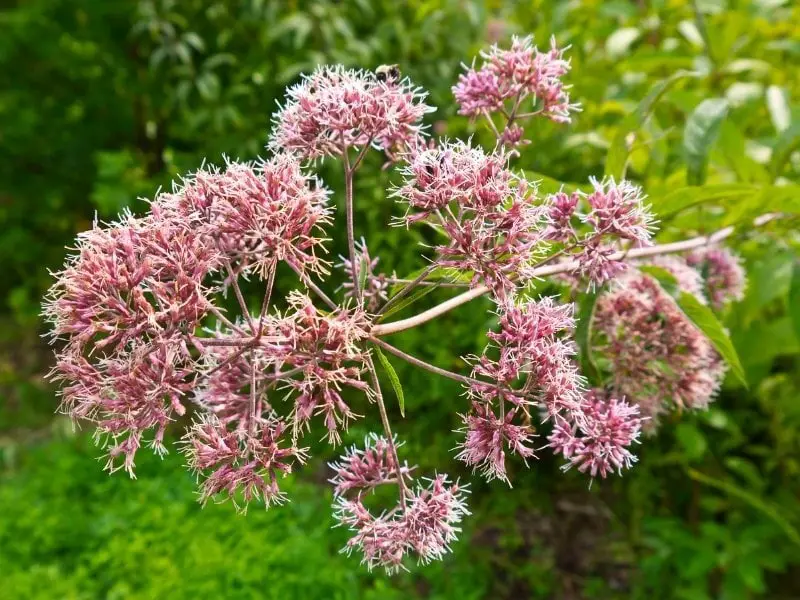Throughout history, people used gravel root and its benefits to treat a variety of health conditions. Nowadays, with the rising love for traditional medicine, gravel root attracted the attention of many people that are determined to explore and find out its true benefits and side effects. Like you!
In my exploration of traditional medicine, gravel root has captured my curiosity with its historical significance and potential health benefits. Join me on this journey as I share my experience delving into the world of gravel root, unraveling its true advantages, and shedding light on any possible side effects. In this article, we’ll make all of that clear. So let’s get started!
What Is Gravel Root

Eupatorium purpureum, commonly known as gravel root or Joe Pye weed, is a perennial plant from the sunflower (Asteraceae) family, originating from North America. With upright thick stems, whorls of leaves at each node, and large purplish flowers.
It grows up to 2.4 meters tall and often found in full sun and moist soils.
Legend: The name Joe Pye weed is said to be inspired by an Abenaki First Nation healer who saved New England colonists from the typhoid fever.
Check out our blog 4 Powerful Poke Root Benefits, Uses & Side Effects. Discover a world of vitality with Poke Root benefits!
Gravel Root Benefits
Kidney Stones

Gravel root is traditionally known for its effects in the treatment of kidney stones. In fact, it is said that the name “gravel root” is derived from its ability to break down stones in the kidney, which are sometimes referred to as ‘gravel.’
Historically, it was believed to soften and dissolve the stones and was commonly used by Native Americans.
However, despite it being popular in folk medicine, currently, there isn’t enough scientific evidence to back up these claims.
Arthritis & Gout

Gout is an incredibly painful form of arthritis caused by excess uric acid in the bloodstream that can affect anyone. It’s described by sudden attacks of intense pain and swelling in (usually) the big toe joints, which can often wake you up in the middle of the night.

While pain medication might help reduce symptoms, it can also cause plenty of side effects if taken for too long, which is why people are looking into more natural remedies, such as gravel root.
Due to its kidney cleansing effects, gravel root may benefit the treatment by preventing the formation of uric acid crystals and reducing uric acid in the joints.
This may be incredibly helpful, considering gout symptoms often occur because of the body’s response to the formation of uric acid crystals.
Gravel root may also have great potential to reduce inflammation in the joints, which could help tackle rheumatic diseases, such as rheumatoid arthritis and gout.
And according to research, that might be due to the plant’s cistifolin content, a cell adhesion blocker that has demonstrated anti-inflammatory activities.
Urinary Tract Infections

Gravel root can offer a soothing effect on the urinary tract. In fact, back in the day, it was commonly involved in the treatment of urinary tract and gallbladder conditions.
That’s because it may encourage the urine flow which helps flush out the bacteria from the bladder and the prostate gland.
In fact, research shows that herbal medicines with diuretic properties can effectively treat urinary tract inflammations.
Fever


Most people have had a fever at least once in their lives, and one thing we all will probably agree on is that it is really uncomfortable. Weakness accompanied by shivers is not what any of us had in mind for that day.
Nowadays, we have easy access to medication that can help fight the symptoms, but our ancestors did not have that luxury. So they often turned to plant-sourced remedies, one of them being gravel root.
Traditionally, gravel root has been used to reduce fever caused by malaria, typhus, or dengue virus. Supposedly, that’s because it helps combat inflammation by inducing sweating and perspiration to eliminate excess water and reduce the fever.
Although there is no research on this particular effect, studies show that it has demonstrated anti-inflammatory activities. And by reducing inflammation in the body, gravel root may lower fever.
Read our blog 4 Proven Teasel Root Benefits For Your Health & What Is It. Explore how this natural remedy can elevate your health journey.
Gravel Root Side Effects & Safety Concerns

There are plenty of safety concerns regarding gravel root use as medicine. And that’s mainly because it can cotain chemicals such as hepatotoxic pyrrolizidine alkaloids that can block blood flow in the veins and even cause liver damage.
Those chemicals can also cause cancer and birth defects. That’s why you should look for gravel root supplements that are certified and a label confirming it is hepatotoxic PA-free.
- Applying gravel root can also cause adverse effects when applied to broken skin. It can be dangerous due to the absorption of chemicals and their toxicity.
- Pregnant and breastfeeding women should avoid using gravel root supplements due to its chemical content and lack of research.
- Gravel root may cause allergic reactions in those who are allergic to certain plant families, including ragweed, chrysanthemums, marigolds, daisies, and many others.
The chemical content and toxicity of gravel root raise some concerns and unfortunately, there is not enough scientific research to confirm its safety and unsafety.
Conclusion

Traditional uses of gravel root indicate that its benefits cannot be denied. And although it may cause some adverse effects, some companies have FDA approvals and are supposedly safe to use.
And with time, and more research, we’ll be able to judge better if gravel root actually does what people historically thought it to do.
So, now that you know how gravel root benefits your body, and how it might hurt it, are you going to try it? If not and you’re looking for a more tame natural root, check out our article about Chaney root.
Frequently Asked Questions (FAQs)
Is gravel root safe for everyone to use?
Gravel root, generally considered safe for most individuals, has a history of traditional use for various health conditions. However, individual responses may vary. Before incorporating gravel root into your wellness routine, consult with a healthcare professional, especially if you are pregnant, nursing, have existing medical conditions or are taking medications. Safety measures ensure a tailored approach, promoting a positive experience with this herbal remedy.
Can gravel root replace conventional pain medications?
Gravel root, renowned for its traditional use in alleviating pain, may offer some individuals a natural alternative to conventional pain medications. While it shows promise, it’s essential to consult with a healthcare professional before making any substitutions. Individual responses vary, and a personalized approach ensures safety and effectiveness. Integrating gravel root into your pain management strategy should be done under proper guidance for optimal results.
What is the recommended dosage of gravel root for digestive benefits?
A recommended dosage is typically around 300 to 400 milligrams per day to harness digestive benefits from gravel root. However, starting with a lower dose and gradually increasing it while monitoring your body’s response is crucial. Consulting with a healthcare professional is advisable to determine the optimal dosage based on individual health conditions and needs, ensuring a safe and effective integration into your wellness routine.
Are there any known side effects of using gravel root?
While gravel root is generally considered safe when used responsibly, excessive consumption may lead to side effects such as nausea, vomiting, or allergic reactions in some individuals. It’s essential to adhere to recommended dosages, and consulting with a healthcare professional before incorporating gravel root into your routine is advisable, especially for those with pre-existing health conditions or taking other medications.
Where can I find reliable gravel root supplements?
For reliable gravel root supplements, consider reputable health stores, online platforms specializing in herbal products, or consult your local herbalist. Ensure the product is sourced from trusted suppliers, and reviews from other users can provide insights into the supplement’s efficacy. Always choose products that adhere to quality standards, and if in doubt, seek guidance from healthcare professionals familiar with herbal remedies.
